
Date: 2024-12-21 Page is: DBtxt003.php txt00023062
INDUSTRIAL POLLUTION
CRUDE OIL
One of World’s Most Polluted Spots Gets Worse as $1 Billion Cleanup Drags On ... Mismanagement, waste and lack of transparency are making the cleanup in the Niger Delta’s Ogoniland anything but exemplary.
CRUDE OIL
One of World’s Most Polluted Spots Gets Worse as $1 Billion Cleanup Drags On ... Mismanagement, waste and lack of transparency are making the cleanup in the Niger Delta’s Ogoniland anything but exemplary.

Original article: https://www.bloomberg.com/news/features/2022-08-31/shell-s-1b-oil-cleanup-left-one-of-world-s-most-polluted-spots-dirtier-for-now
Peter Burgess COMMENTARY
This story about oil pollution in Nigeria is quite personal.
I got to know this part of Nigeria ... that is the Niger Delta back in the early 1970s when I was the CFO of Continental Seafoods and later when I was doing consulting work for the World Bank and the United Nations.
I got to know something about the Niger Delta when our company got involved in a joint venture called the Nigerian National Shrimp Company (NNSC) between our company and the Federal Military Government (FMG) of Nigeria and the Mid-West Government of Nigeria. The original plan was to operate from an existing port at Koko in the Niger Delta that had good facilities ... quai and warehouse structures ... but had almost no commercial activity. This plan changed in 1973 with the OPEC oil shock and the dramatic increase in crude oil prices, and Nigeria suddenly had oil revenues to pay for imports. I was physically at Koko port with the Port Manager when the first commercial shipment came to Koko and it became clear that the NNSC was not going to be able to use this location for its shrimp fishery operations.
After some delay, we located a property in Ogharefe, on a branch of the Niger Delta near Sapele, and set about building a small fishing port together with shore support facilities, shrimp processing plant and cold stores. Before we acquired the property it had been used in connection with export of lumber, which arrived from upstream in log rafts. In order to get permission from the government authorities I had to prepare and submit the engineering drawings for everything we had planned for the site ... which I did based on what I had learned as an engineering student some 15 years before. One of the issues we had to concern ourself with was the lack of any solid grounding for foundations ... essentially the hard ground was floating on top of a lake of slurry washed down the river over centuries.
Sapele and Ogharefe are not far from Benin City and Warri ... a little bit North of the Ogoniland talked about in this video. In the easrly 1970s when the the NNSC operation was being put together I travelled between Ogharefe and Benin and Lagos almost every month. We were just outside the environmental disaster being talked about in the video.
In the early 1980s I was recruited to be the team leader for a UN/IFAD project being evaluated in this general area ... actually the four States of Cross River State, Akwa Ibom State, Edo State and Rivers States with main cities of Calabar, Uyo, Ala Oji and Port Harcourt. The project as being designed to support the artisanal fisheries of the region which were being seriously damaged from the pollution of the oil extraction industry throughout the region. What we saw of the pollution from the oil industry was horrendous at that time, and by all accounts got worse in subsequent years.
I have never been a 'shrinking violet', and the evaluation report that our team produced for IFAD did not sugar coat the crisis of the artisanal fisheries and the local people of the area that depended for their livelihood on fishing ... but for all practical purposes nothing of substance got done. The explanation was not difficult to understand.
IFAD is a UN agency located in Rome close to FAO. They both concern themselves with agriculture and fisheries, but while FAO is funded like most other specialized agencies of the UN, IFAD is funded by the oil-rich Arab countries. IFAD is not particularly free to be critical of the energy (oil) industry which has done ... according to our draft report ... untold damage to this artisanal fishery.
Though our team had official standing ... the oil company management in the region studiously avoided any contact with me or our team. My impression at the time was that the international oil company strategy was to recruit respected local elders into their management ranks, which worked to do reputational damage control in the local area, but not so much for the rather rare international team like our own.
But the big international companies operating in the region had another problem. Africans may not be technically sophisticated in a Western sense, but they are better than most at mechanical improvision and they have figured out all sorts of ways to divert flows of crude oil away from the corporate pipelines into all sorts of locally operated subsidiary and informal pipelines to get processed somewhere in the bush and eventually get sold into a very active and extensive informal and illegal market.
Attempts are any sort of law enforcement have been perfunctory at best. Informal payments ... corruption that is ... are likely to be substantially bigger than the base pay of most ordinary working people. It is no surprise, therefore, that the system as a whole gets worse and worse rather than better and better.
The big international companies like Shell, Chevron and others that have been the foundation for both the environmental and the social mess that has metastasized over several decades have avoided being held to account using rather crude legal maneuvers ... pushing responsibility as far from the head-office to remote local subsidiaries as they possibly can. Whether this will work, remains to be seen, but they are obviously trying to do this.
I would like to be optimistic tha things are going to get better for the people impacted by the environmental mess in Nigeria, but I am not. Even if a lot of money is made available for a massive clean up, it is unlikely that the money will end up in the right places ... and in the end it will be the 'same old, same old' mess that people will have to contunue to live with.
For me, I am a little bit encouraged because it is clear that there are no existing management metrics that can be applied to get effective oversight of this whole crisis. The conventional financial management accounting works quite well for corporate profit optimization, but does not work to delived performance accountability in situations like the one in the Niger Delta. My work with TrueValueMetrics has the potential to be an answer, and I hope this will help in due course.
Peter Burgess
Mismanagement, waste and lack of transparency are making the cleanup in the Niger Delta’s Ogoniland anything but exemplary, UN reports indicate.
Written by Neil Munshi and William Clowes ... Bloomberg Green ... The Big Take
August 31, 2022 at 12:00 AM EDT
When a $1 billion Shell-backed cleanup began in 2019 of the disastrous oil contamination in the southern Nigerian region of Ogoniland, it was heralded as the most ambitious initiative of its kind anywhere. But as Neil Munshi and William Clowes report exclusively, United Nations Environmental Programme documents indicate the project — far from being exemplary — is making one of the Earth’s most polluted regions even dirtier.

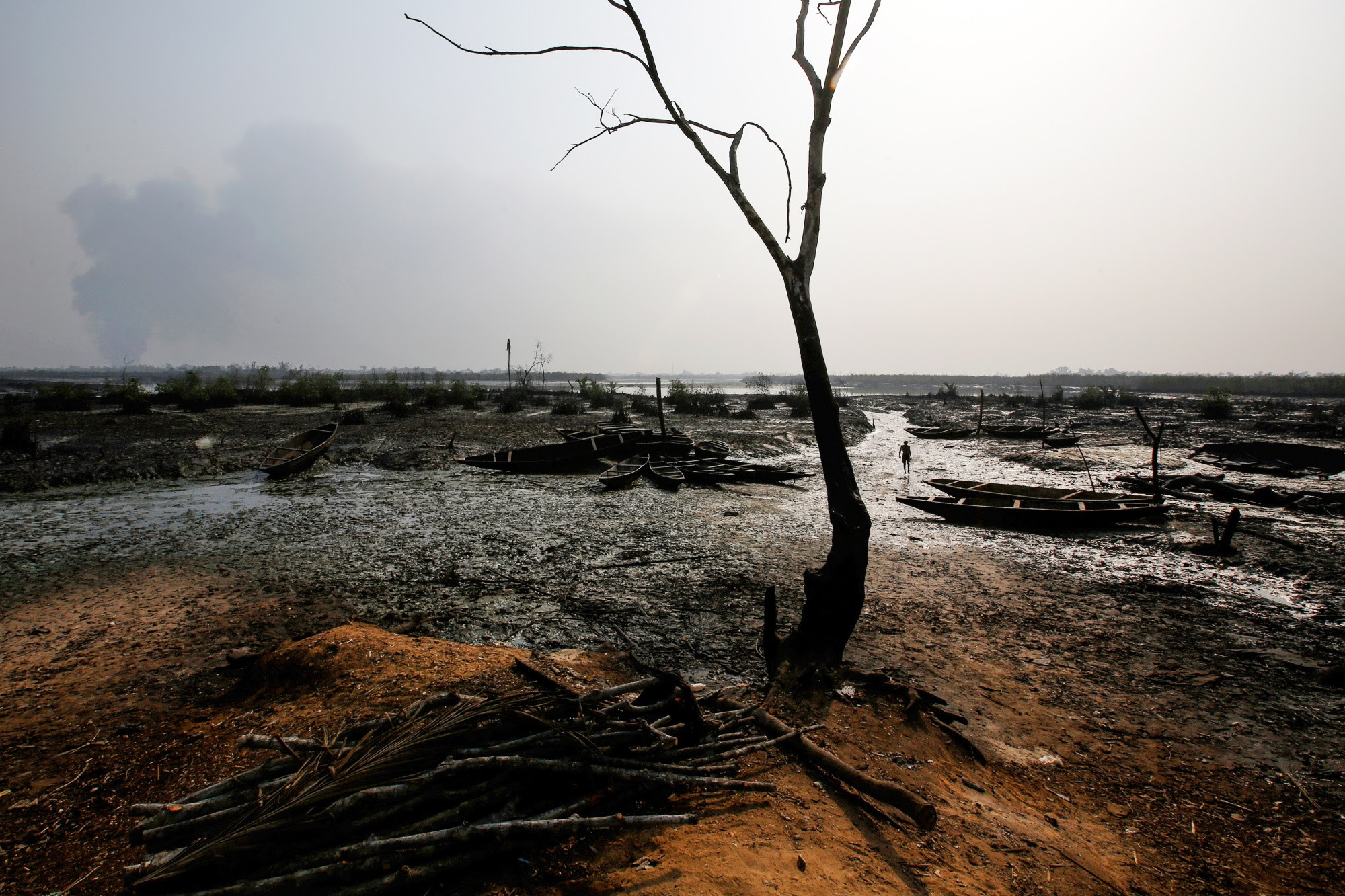
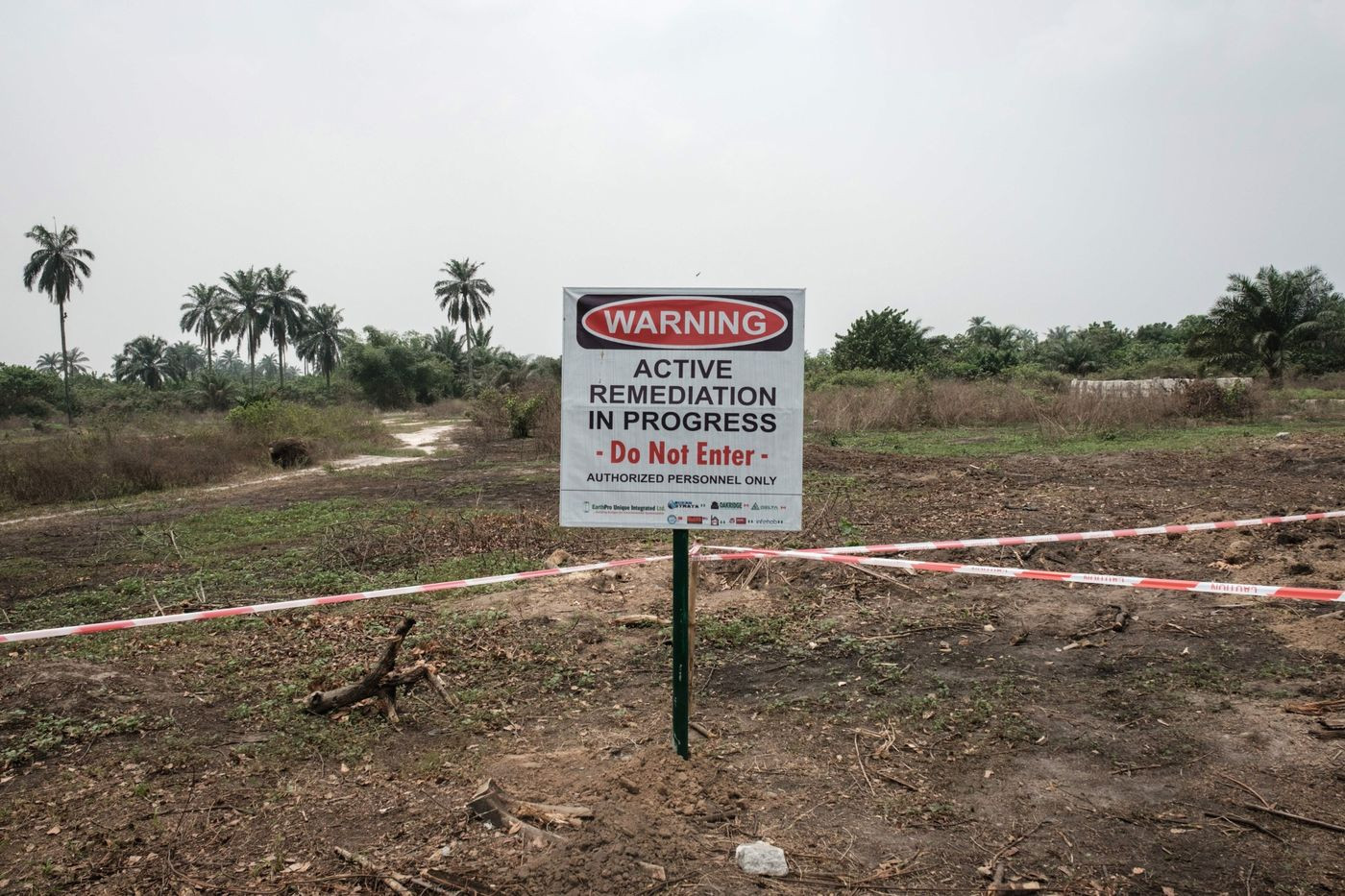
A Hyprep remediation site in Eleme, near Port Harcourt, in 2019. Photographer: Yasuyoshi China/AFP/Getty Images
In the more than a quarter century since Shell Plc left Ogoniland in southern Nigeria, oil has continued to ooze from dormant wellheads and active pipelines, leaving the 386-square mile kingdom’s wetlands shimmering with a greasy rainbow sheen, its once-lush mangroves coated in crude, well-water smelling of benzene and farmlands charred and barren.
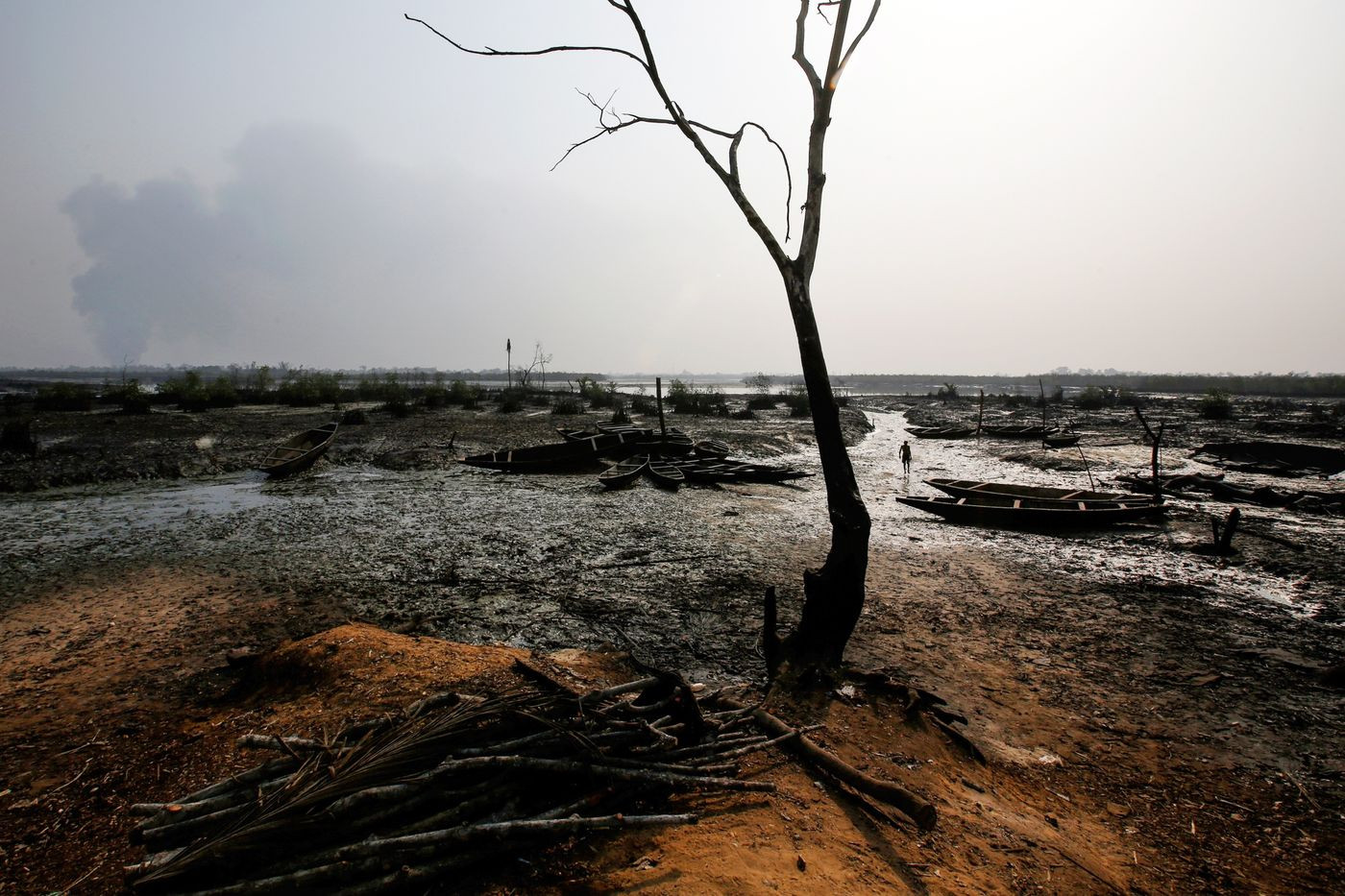
The Toxic Legacy of 60 Years of Abundant Oil ... Abandoned fishing boats in an estuary polluted by crude oil in Ogoniland, in 2020. Photographer: George Osodi/Bloomberg
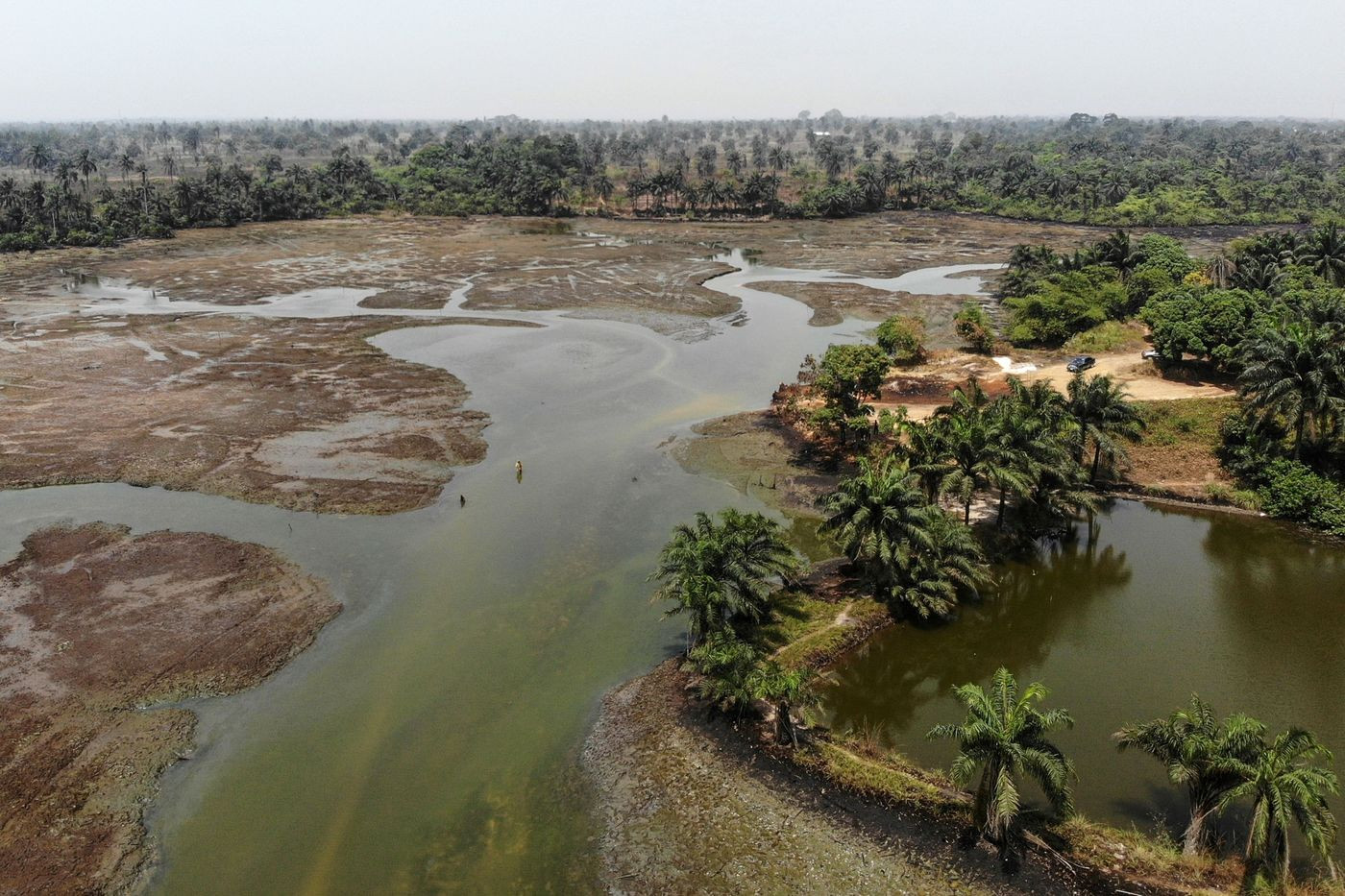
The Toxic Legacy of 60 Years of Abundant Oil ... Fishermen in polluted waters in the Delta region of Goi, in 2020.Photographer: George Osodi/Bloomberg
So when the $1 billion Ogoniland cleanup began in 2019, backed by Shell’s funding pledge and support from the United Nations, it was heralded as the most ambitious initiative of its kind anywhere in the world. But now, UN Environmental Programme documents seen by Bloomberg and reported for the first time indicate that the project — far from being exemplary — is making one of the earth’s most polluted regions even dirtier.
“We had hoped that the Ogoniland cleanup process would set the standard for the cleanup that will have to take place in the Niger Delta as a whole,” said Mike Karikpo, an Ogoni attorney with Friends of the Earth International. “But we’ve not seen any impact. There ought to be some impact on the lives and livelihoods of people whose lands and rivers were impacted by this oil.”
In a scathing review of the Ogoniland cleanup efforts, led by the Hydrocarbon Pollution Remediation Project, or Hyprep, the UN body paints a picture of rampant mismanagement, incompetence, waste and lack of transparency. It highlights the haphazard storage of oil-soaked soil that lets chemicals seep into uncontaminated grounds and creeks, contracts awarded to firms with little environmental-cleanup experience and proposals for millions of dollars in unneeded work.
NIGERIA-ENVIRONMENT-POLLUTION-OIL-REMEDIATION
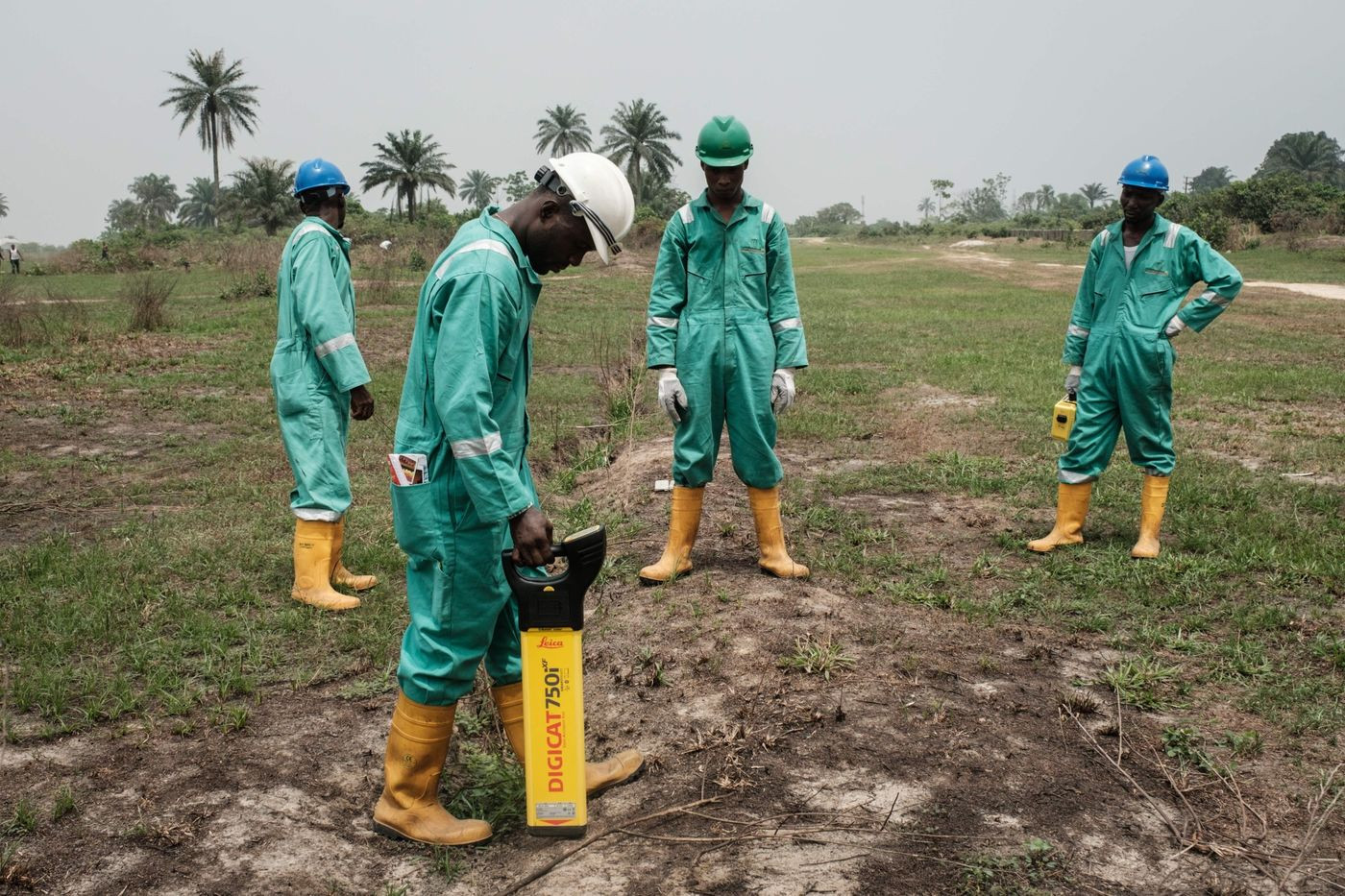
Hyprep remediation workers try to locate oil pipelines in an oil spill impacted area in Eleme, in 2019. Photographer: Yasuyoshi Chibu/AFP/Getty Images
NIGERIA-OIL-ENVIRONMENT-POLLUTION-ONOGILAND
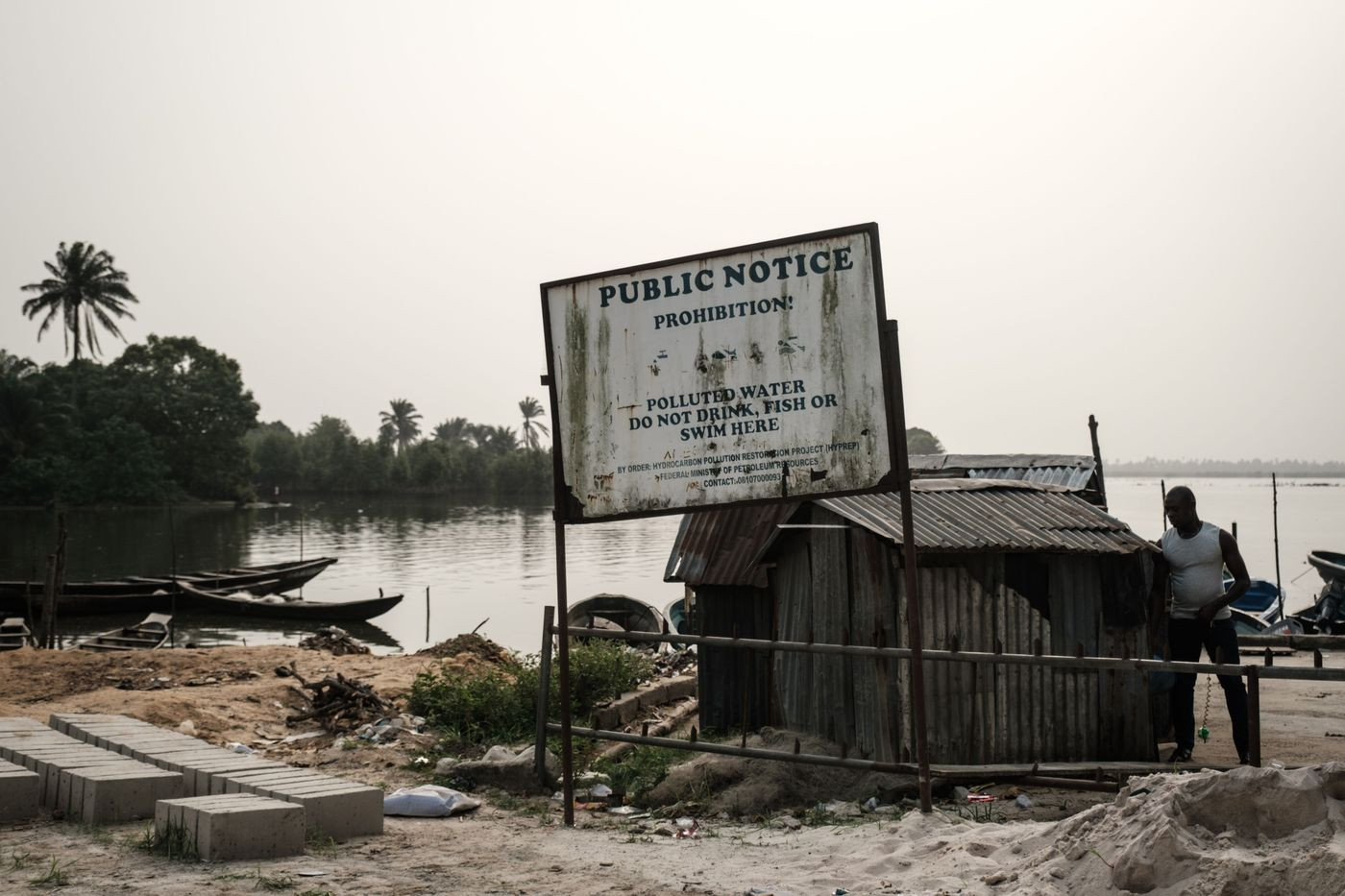
A public warning sign by Hyprep reads: 'Polluted water - Do Not Drink, or Swim Here,' on the River Bodo, in the Delta region, in 2019.Photographer: Yasuyoshi Chiba/AFP/Getty Images
Bloomberg reviewed six UNEP documents produced over the past year, some of which had been shared with Nigeria's environment ministry, Hyprep and its governing bodies. They included an audit of ongoing cleanup efforts, a look at Hyprep’s bidding process and a list of recommendations for restructuring the agency.
Hyprep dismissed UNEP’s criticism as “baseless, untrue and unfair,” with its director of technical services, Philip Shekwolo — a former Shell official — saying in an emailed response to questions that the government body designed its techniques specifically to avoid the “possibility of secondary pollution” and has so far provided exceptional value for money. The Nigerian government didn’t respond to requests for comment. Stefan Smith, a UNEP senior program manager, declined to comment on non-public documents, while saying that the UN body is “currently wrapping up its project support in line with the agreed date at the end of 2022.”
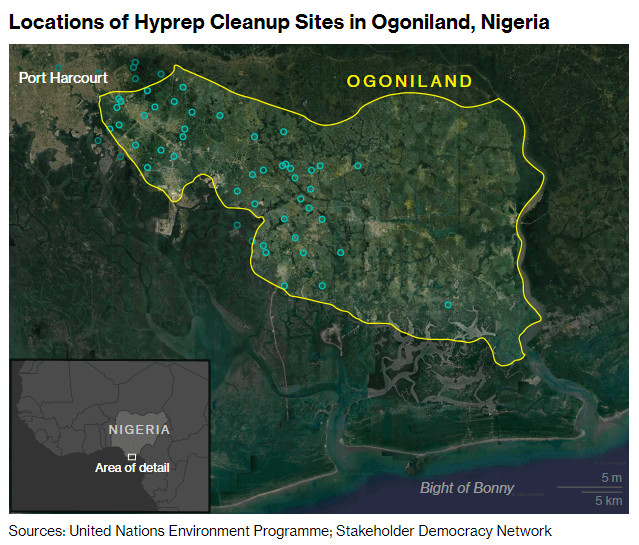
Locations of Hyprep Cleanup Sites in Ogoniland, Nigeria ... Sources: United Nations Environment Programme; Stakeholder Democracy Network
In an emailed response to questions, Shell said: “We recognize how important the success of the cleanup is to Shell and will continue to explore every opportunity to provide technical support to Hyprep.”
The London-based company’s wholly owned local subsidiary Shell Petroleum Development Company of Nigeria, or SPDC, sits on Hyprep’s governing council and board of trustees. Shell blames oil theft and sabotage for most of the interminable spills that plague the delta, but said it cleans up areas affected by leaks originating from its facilities, irrespective of the cause.
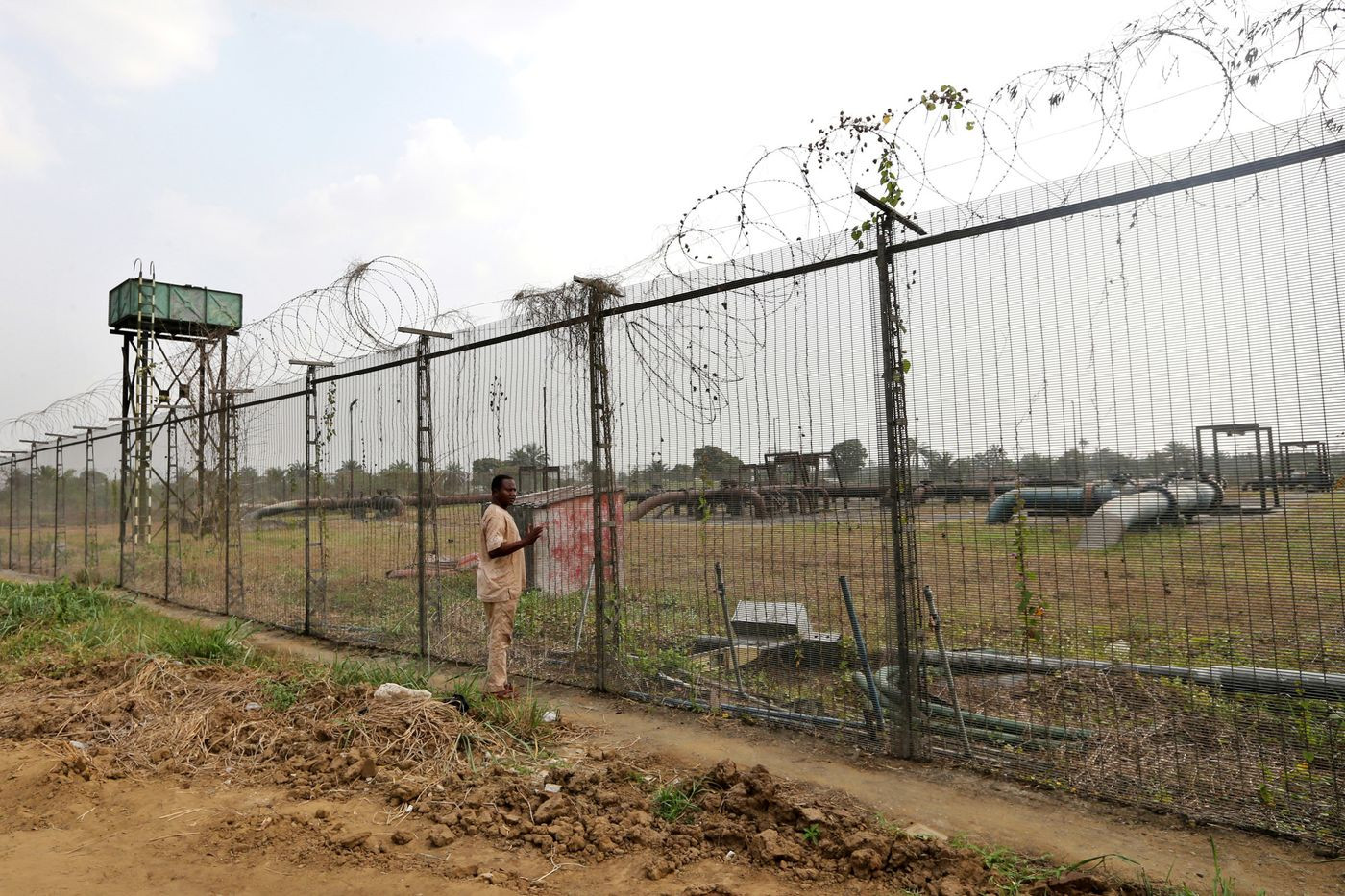
Local Economy And Oil Pollution In The Niger Delta ... Shell has built more than 6,000 kilometers (3,700 miles) of pipelines in Nigeria.Photographer: George Osodi/Bloomberg
As Hyprep’s practices and effectiveness are questioned, Ogoniland residents and their international representatives say the European energy giant and others who pumped oil there should be held to greater account.
“The oil companies should be responsible for cleaning up the environment,” said Daniel Leader, a partner at UK law firm Leigh Day that represents an Ogoni community and another group of delta villages in an ongoing case against Shell. They “have essentially deflected their legal obligations and created this para-statal that has failed to deliver.”
Shell’s liabilities in the Niger Delta have been mounting — it paid 55 million pounds ($66.4 million) to the Bodo community in 2015 and agreed to cough up 45.7 billion naira ($109 million) last year to compensate the Ejama-Ebubu community. The company’s efforts to sell onshore assets in the country have stalled pending a decision on $1.9 billion in compensation it was ordered by a Nigerian court in 2020 to pay to 88 plaintiffs.
Last year, it suffered defeats in two landmark overseas cases brought by Niger Delta communities. A January 2021 court ruling in the Hague ordered Shell’s Nigerian unit to pay unspecified damages to farmers for oil spills that occurred more than 15 years ago. A few weeks later, the UK supreme court ruled that cases brought by the Bille community and the Ogale people in Ogoniland could be heard in English courts.
The Toxic Legacy of 60 Years of Abundant Oil
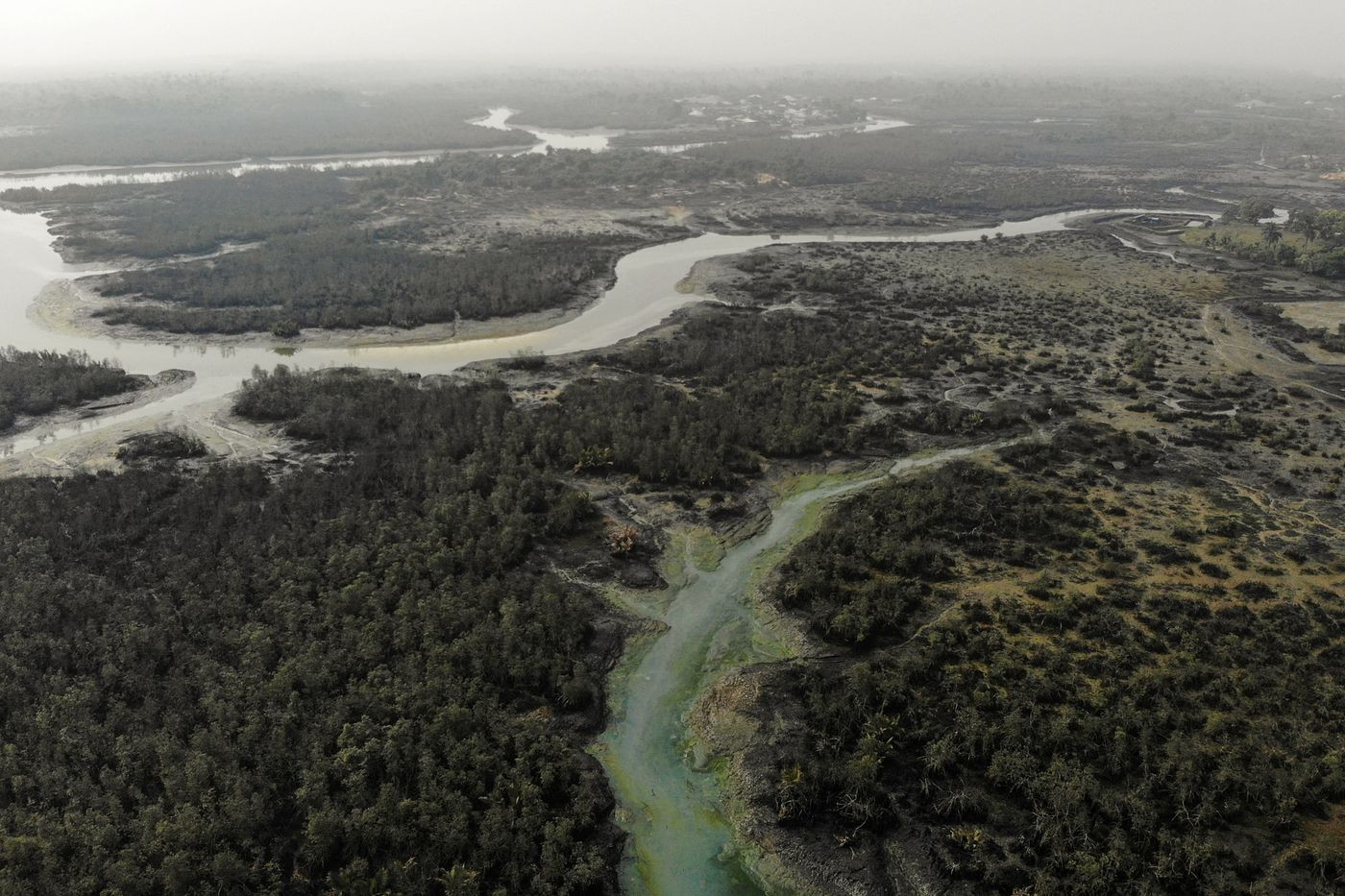
Crude oil pollutes the waters of an estuary in B-Dere, in 2020. The Niger Delta is a 27,000-square-mile network of labyrinthine creeks fringed by rich mangrove forests.Photographer: George Osodi/Bloomberg
The UK judgment is “a big deal because obviously there are significant liabilities arising out of Shell’s Nigerian operations and they wanted to isolate the parent company from being held responsible,” said Leader, noting that investigators working for his law firm are interviewing thousands of people in the delta who could be brought into the case.
Ogoniland is a small sliver of the Niger Delta, which is a vast, fertile, 27,000-square-mile network of labyrinthine creeks fringed by rich mangrove forests that is home to more than 30 million people. Around 60% of Nigeria’s 1.3 million barrels a day comes from the delta and near its shores, flowing through miles of aging, largely-unsecured pipelines — easy pickings for thieves in one of the poorest places on earth. The head of Nigeria’s national oil company said in April that the country loses about a fifth of its oil production to theft every day.
Shell maintains that criminality is the root cause of the area’s ecological woes.
“We continue to believe that litigation does little to address the real problem in the Niger Delta: oil spills due to crude oil theft, illegal refining and sabotage with which SPDC is constantly faced and which cause the most environmental damage,” it said. “SPDC works closely with the regulators, local communities and other stakeholders to address this challenging issue.”
NIGERIA OIL EXPLOSION
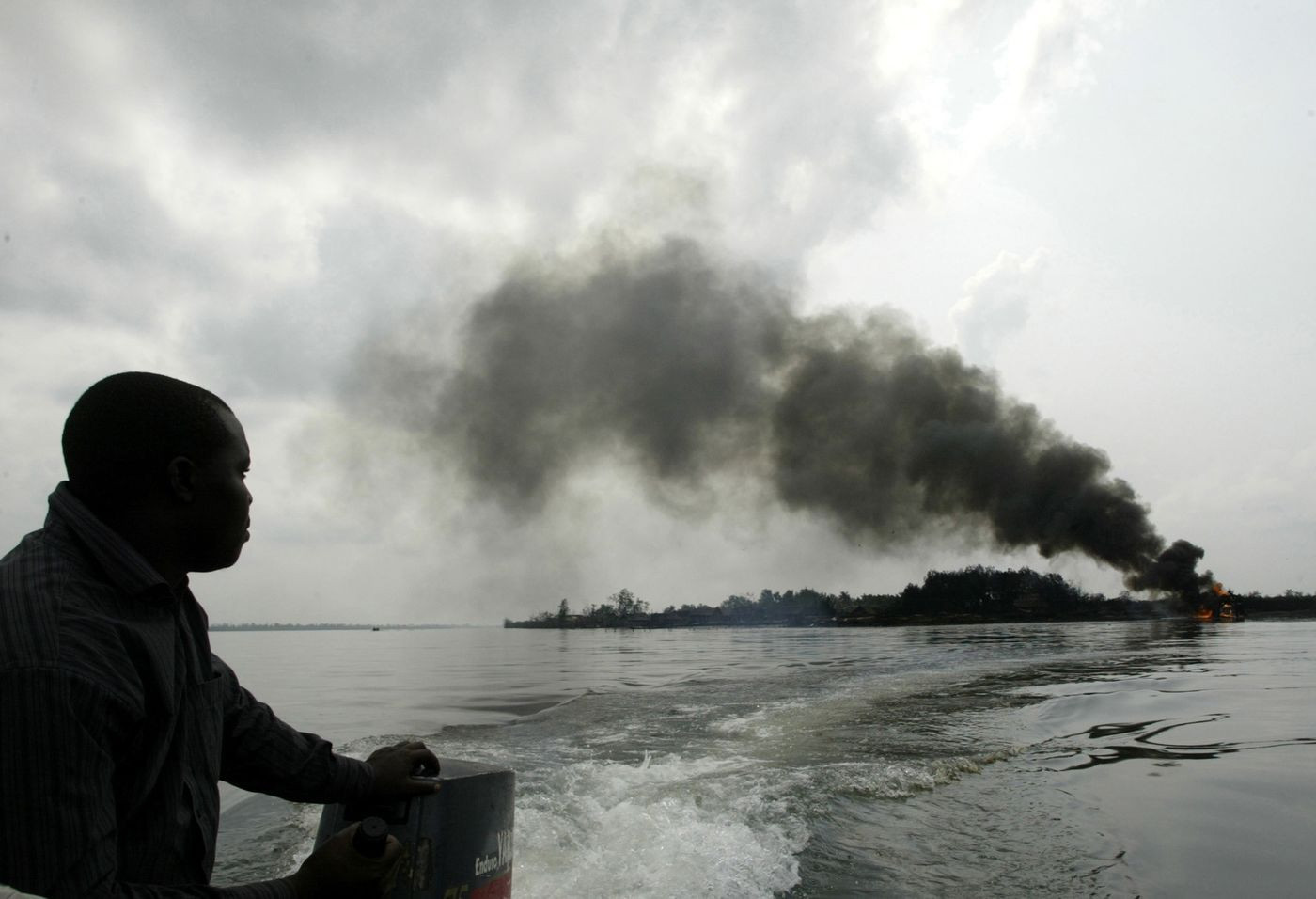
Smoke from a ruptured oil pipeline belonging to Shell Plc in Asagba Okwan Asarama, Niger Delta, about 50km south-west of Port Harcourt, in 2005. Photographer: George Osodi/AP Photo
Shell has been the most dominant oil company in Nigeria since it first struck oil in the Niger Delta in 1956. It has built more than 6,000 kilometers (3,700 miles) of pipelines, drilled more than 1,000 oil wells and produces 39% of the country’s crude. Its local joint venture pumped oil in Ogoniland from the late 1950s to 1993, when it left the area amid mass protests led by the writer Ken Saro-Wiwa accusing it of polluting farmlands and fisheries. The military government brutally cracked down on the protests, executing Saro-Wiwa and eight other Ogoni leaders in 1995.
“Shell has never taken responsibility for anything they did,” said Patience Osaroejiji, head of the Coalition of Ogoni Women. “If you go to the places they say they cleaned up, you will see that oil is still running there. Nothing you can plant there grows. The grass can’t even grow.”
Oil pumped by Shell and other companies including Chevron, ExxonMobil and Eni helped to turn Nigeria into a prime example of the resource curse. As the oil industry flourished — generating billions of dollars in profits for the companies — it propagated corruption, conflict, inequality and environmental distress. Now, with the world weaning itself of fossil fuels, these energy giants are leaving the Niger Delta to concentrate on deep-water blocks, selling their decades-old infrastructure to local firms.
See Bloomberg video here:
http://www.truevaluemetrics.org/DBadmin/DBtxt003.php?vv1=txt00023063
“The oil industry is quite an ungoverned theater of operation,” said Iniruo Wills, a lawyer who represents communities in disputes with oil companies and the former environmental commissioner of the crude-rich Bayelsa state in the delta. “Regulators are not doing their work. They are looking the other way. They seem to be fully captured and in the pockets of the operators they should be regulating.”
Shell denied all suggestions of corruption in its Nigerian operations, saying it has “an anti-bribery and corruption policy and would not condone any unethical practice among our staff and contractors.” It also said all sites it has cleaned have been certified by Nigerian regulators.
Last summer, Shell announced plans to sell its remaining onshore licenses, blaming, in part, “community problems” that made the operations too risky. Many Ogoni blame Shell itself for creating the region’s troubles. Celestine Akpobari, a 50-year-old Ogoni environmentalist, recalls how cassava harvests at his family’s farm steadily died as oil production ramped up.
“What I remember them for is destroying our environment, destroying the livelihoods of our people, and sharply dividing our communities,” said Akpobari, who serves as a civil society representative on Hyprep’s governing council. “Shell’s name is a taboo here.”
A 2011 UNEP report proposed the establishment of an initial $1 billion fund to repair the damage done by decades of crude spills, leading President Muhammadu Buhari to create Hyprep in 2016. Shell’s venture with Nigeria’s national oil company, which counts Total and Eni as minority shareholders, pledged to pay for 90% of it. UNEP’s role was limited to observing, training and capacity building. The UN body has estimated that the environmental restoration of Ogoniland could take as many as 30 years.
Hyprep’s cleanup efforts began about a year after it received $180 million, the first of five planned tranches from Shell’s joint venture. It has since received one more tranche, with a third on its way, bringing the total to $540 million. Hyprep spent about $66 million of that from 2019 to 2021, with half allocated to cleaning contaminated soil, according to Shekwolo. Hyprep’s July progress report says contractors at all but two of the 50 lots distributed so far have completed their cleanup work.
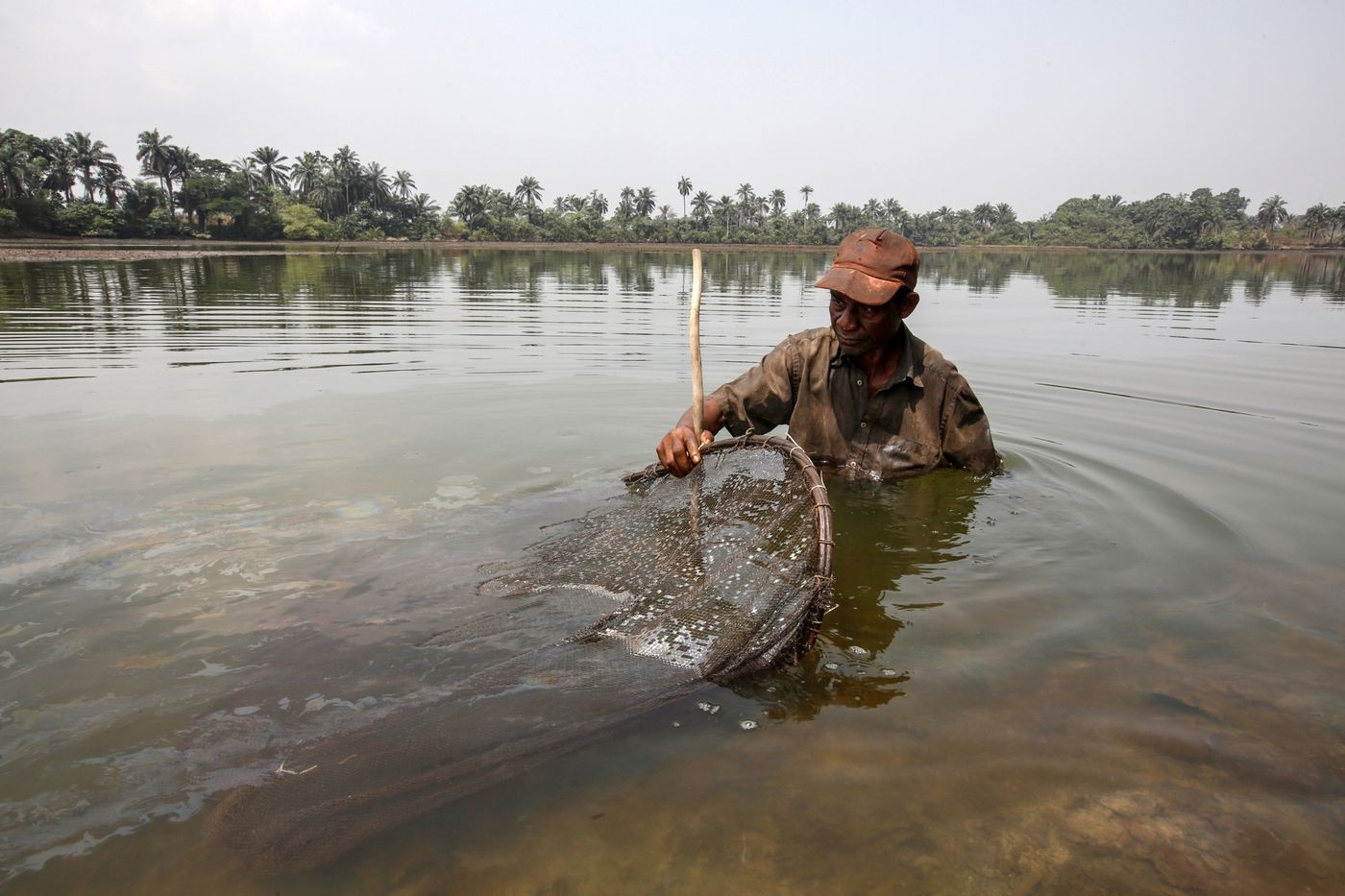
The Toxic Legacy of 60 Years of Abundant Oil ... A film of oil floats on the water’s surface while a fisherman casts his net in Ogoniland in 2020.Photographer: George Osodi/Bloomberg
Hyprep’s governing council has approved $296 million in spending this year — roughly 8.5 times what it spent last year, according to its budget documents. Among areas awaiting treatment is the 79-hectare Ajeokpori-Akpajo site, where cleanup work proposed by Hyprep that is “not an appropriate use of resources and is not scientifically defendable” could cost up to $50 million, the UN body wrote in an April letter to Nigeria's environment minister. It could “pose serious reputational risks to Hyprep, UNEP and SPDC,” it said.
Of particular concern was the continuation of the approach adopted in earlier rounds of subdividing cleanup sites into small lots, which “cannot be justified scientifically, financially nor logistically.” These allocations were “done arbitrarily to maximize the number of contracts to be awarded,” according to a November 2021 UNEP presentation.
Bid proposals “full of errors” create the “impression that Hyprep is not a competent entity,” UNEP wrote in a review this year. It noted in another document that the body, which hasn’t produced any audited accounts, lacks “necessary transparency and accountability.”
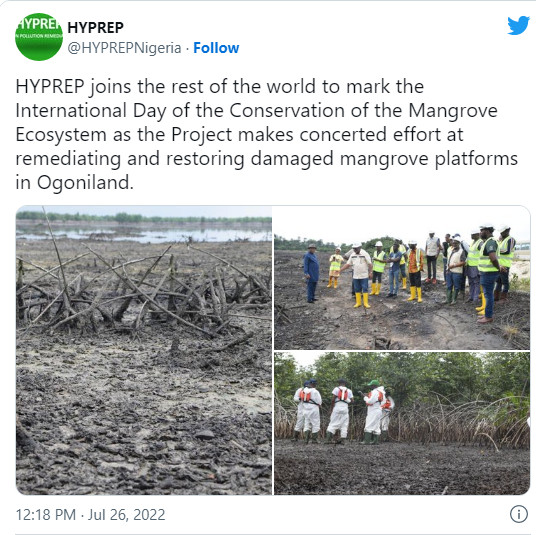
Hyprep’s Shekwolo dismissed the criticism, saying the $50 million plan emerged after additional sampling and mapping were carried out to reduce the quantity of soil to be cleaned proposed by UNEP. Bid-document alterations recommended by UNEP, he said, were “fundamentally flawed.” He also said that Hyprep’s accounts are being audited and “will be made public by the appropriate authorities at the appropriate time.”
Generations of Ogoni, sitting at the heart of Africa’s biggest petroleum industry, have waited decades and had hoped Hyprep would spur the region’s revival. But its record so far is cause for concern for locals. The body hasn’t properly cleaned up even the least-contaminated sites, classified as “simple,” according to the UNEP’s November audit.
Most contractors couldn’t explain the quantities of chemicals used to treat polluted earth, and some displayed “very poor waste management and disposal methods,” the audit notes. There must be a “more robust selection” of contractors “to ensure they have the necessary experience, staff and finances,” a UNEP document from March stated. The list of the first 16 companies to be awarded cleanup contracts, reported earlier by Premium Times, included poultry farms and palm oil manufacturers.
It is “common knowledge that the contracts that have been issued were not given out to the companies based on their capacity or pedigree, on whether they have a track record,” said Erabanabari Kobah, a lawyer and environmental activist from Ogoniland.
NIGERIA-ENVIRONMENT-OIL
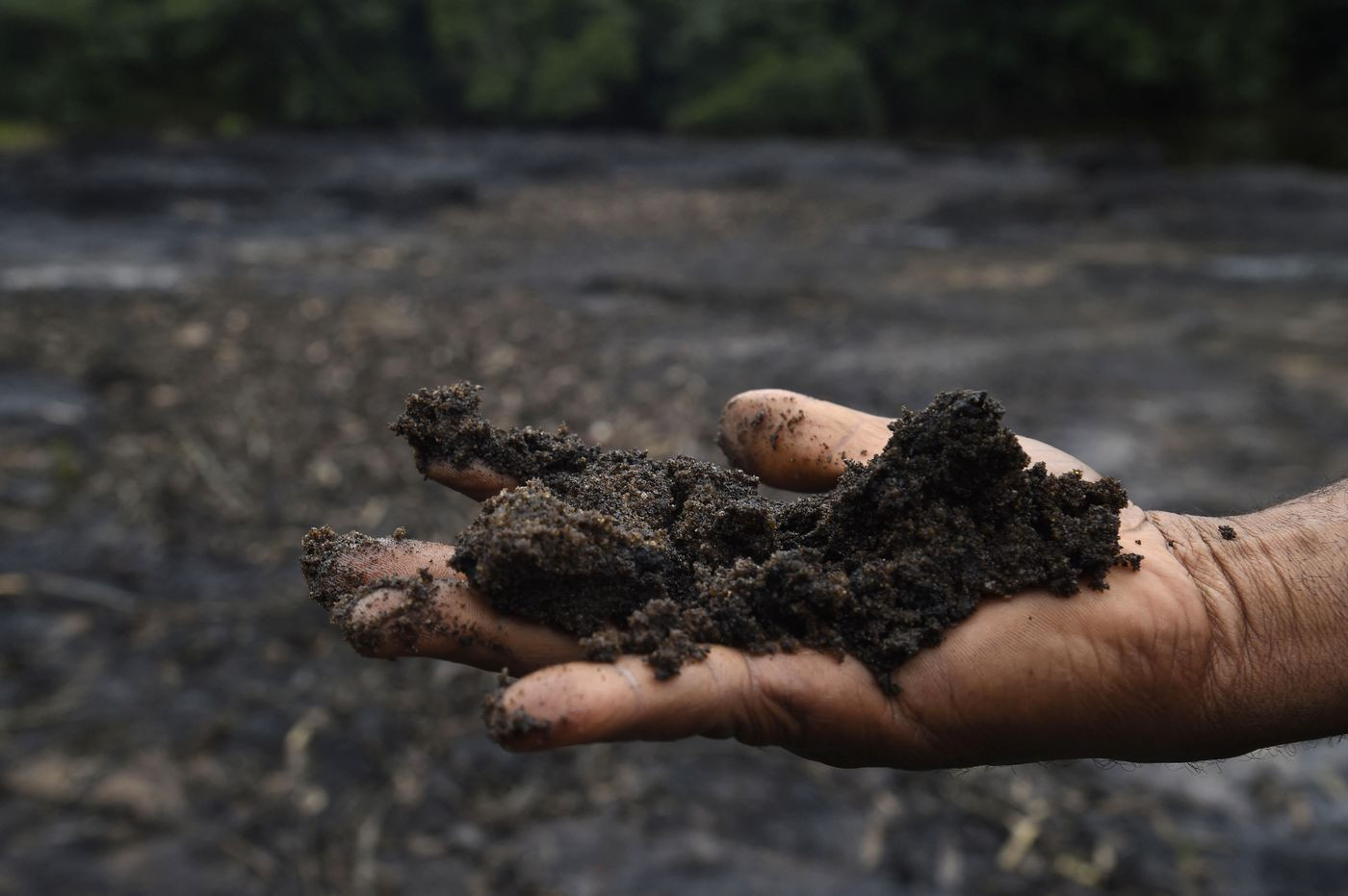
A farmer holds dark oil-soaked soil excavated from a river shoreline polluted by oil spills at B-Dere, Ogoniland, in August, 2021.Photographer: Pius Utomi Ekpei/AFP/Getty Images
Hyprep-hired companies clean oil-saturated soil by storing it in shallow pits lined with tarps where microbes eat polluting hydrocarbons. But those pits are often overloaded or “poorly constructed” — with torn liners and poor drainage — “creating pollution pathways and potential contamination of underlying soils,” UNEP said in a 2021 review of work at 29 lots. Piles of the contaminated soil left outside the biocells for long periods of time meant the hydrocarbons seeped into uncontaminated land and creeks, “thus increasing the pollution footprint,” it said. The report includes pictures of murky, green rivulets flowing out into nearby land and waterways.
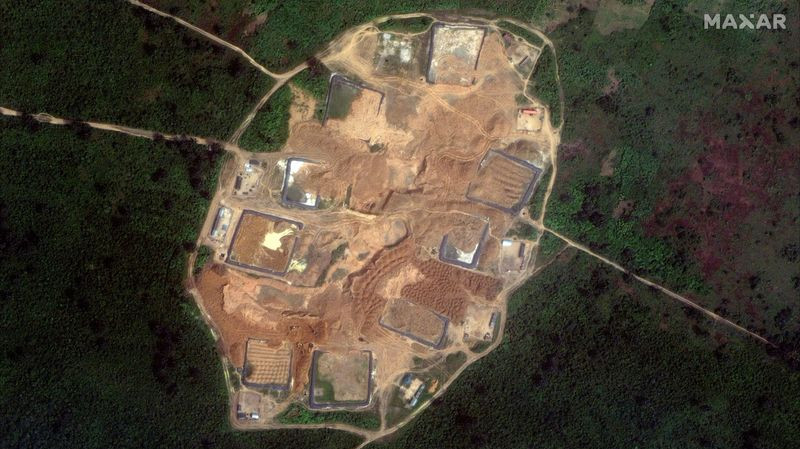
Satellite image of a Hyprep cleanup site in Oyigbo where UNEP documented overloaded biocells that could cause pollution to spread into nearby land and waterways.Source: Satellite image 2022 Maxar Technologies
“Technically, what is going on is not bioremediation but largescale, uncontrolled soil-washing — but being presented as bioremediation,' according to a slide-show presentation by UNEP in Geneva in November 2021. It was critical of cleanup certifications, citing “questionable” sampling protocols and laboratory quality. Hyprep has said half of its current projects have been certified as clean by regulators.
Even as questions remain over its handling of simple projects, Hyprep’s budget this year has earmarked $171.6 million for the more technical work of cleaning more complicated sites — projects that it estimates will cost hundreds of millions of dollars in the years to come. UNEP has advised Hyprep against contracting complex sites until its capacity is “significantly improved.”
While large sums are being spent, Hyprep’s oversight is haphazard, with supervisors “generally absent when key project activities are carried out — hence there is a high likelihood that breaches in instructions and protocols go unnoticed,” UNEP said in one of the documents.
Shekwolo defended Hyprep’s record, saying if supervision skills are “inadequate,” the training provided by UNEP “should be questioned.” He said sites had been divided “to allow for lesson learning” so Hyprep could develop skills for the more complex parts of the project in areas close to people’s homes. Hyprep has asked UNEP to recommend international companies that may be interested in bidding, he said.
NIGERIA-ENVIRONMENT-POLLUTION-OIL-REMEDIATION
Hyprep's budget this year has earmarked $171.6 million for the more technical work of cleaning more complicated sites.Photographer: Yasuyoshi Chiba/AFP/Getty Images
Meanwhile, the mere involvement of Shekwolo has rankled some locals. He spent nearly two decades at Shell, where he last ran its Ogoniland cleanup efforts, before becoming Hyprep’s acting project coordinator in 2021. Although Shekwolo was replaced in March by a former UNEP consultant, he continues to hold an influential position as director of technical services.
“These are persons who actually caused the problem and they have inserted themselves in the process of finding the solution…There is everything necessary for them to try to skew the process so that it doesn’t make them look bad,” said Friends of the Earth’s Karikpo. “They should merely pay for the damage that they caused and let experts do the work.”
Shekwolo rejected allegations he is overseeing sites that are already supposed to have been cleaned on his watch at Shell. He disputed UNEP’s findings from 11 years ago that 10 of 15 sites in Ogoniland certified as cleaned by Shell were still contaminated, saying they had been “re-polluted” by new oil spills. Shekwolo said he introduced “the most environmentally friendly remediation technique the world over” as a Shell employee and has “worked tirelessly” for 20 years to bring about the ongoing restoration of Ogoniland’s environment.
While UNEP has called on Hyprep to “adopt a culture of zero-tolerance to corruption or financial malpractice,” few ordinary Ogoni trust the process.
“The vast majority of our people feel they’ve been taken advantage of once more,” said Karikpo. “The Nigerian state, the oil companies and a few Ogoni elites have taken advantage of the rest of us. There is nothing tangible on the ground.”